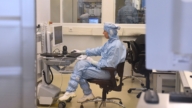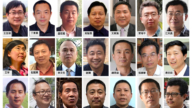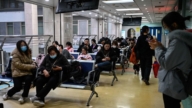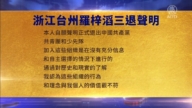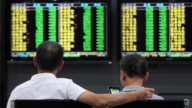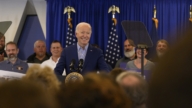【新唐人2014年06月17日讯】中共在国际上大搞金钱外交,日前有媒体报导,50年代初至09年底,中共对外提供援助的金额超过2500多亿元。而评论人士指出,中共对外援助过程中的腐败问题鲜为人知,早已形如巨大的黑洞。
中共媒体报导说,自1950年到2009年底,中共对外提供援助金额累计达2500多亿元,其中国家财政支出无偿援助1000多亿元,商务部今年预计支出的257亿元中,对外援助支出预算达212亿元。
香港《太阳报》表示,如此庞大的对外援助金额,在长达60多年时间里,腐败问题形如黑洞却鲜为人知。报导说,很多主管援外的官员,在制订预算时“报大数”、或者编造项目,另立开支,以对外援助为名,进入个人账户,或向受援国收取回扣,要各种好处费,还有一些官员凭一时好恶,送出巨额援助。
中国金融智库研究员巩胜利指出,事实上,除了援外之外,中共对外经贸采购大单,以及美国国债购买等方面,也都存在不为人知的腐败。
他举例说,比如中国购买美国国债,其中有8000亿美元在美国财政账号里查不到,那么这些钱哪去了呢?
中国金融智库研究员巩胜利:“它通过第三者的公司,用国外的公司,来买的美国的国债,这样统计,就不是中国的﹔还有一个方面,比如说它利用瑞士也好、英国也好,这些中国的企业购买美国的国债,没有通过国有资本、国家渠道来进行操作,它的钱都通过第三者或者第三个渠道进出和往来。”
巩胜利指出,这样的情况,在中共所有对内、对外援助,以及商业运行中普遍存在,那么巨大的资金,为什么要通过第三方来运行呢?
巩胜利:“它有一个例子,比如像‘六四’期间,中国被全世界的国家制裁,如果通过制裁的话,中国国有的资本,一分钱都进不去,出不来,它为了避免这样的事情再一次发生,所以它通过第三者公司来进出资本。”
巩胜利指出,再加上中共援外制度不透明,缺少监管,很多援外项目又被视为机密,所以许多腐败问题也被掩盖。
6月16号,中共总理李克强出访英国,中共驻英国大使刘晓明表示,中、英两国将签署40多个政府和商业协议,涉及能源、投资、金融等领域,总额约300多亿美元,是历年来最高。
英国《路透社》报导说,在李克强出访前夕,中方警告英国,如果想要有良好的经济关系,就不要在人权问题上“指手划脚”。
今年4月,英国在一份报告中批评中国人权,惹恼了中共,报告中把中国列入人权“关注国家”名单,批评中共在2013年加大了对言论、自由和结社、集会自由的压制。
原《河北人民广播电台》编辑朱欣欣指出,中共多年来的独裁暴政,抵触普世价值,遭国际谴责,被国际孤立,所以它需要搞金钱外交才能拉拢其他国家。
原《河北人民广播电台》编辑朱欣欣:“主要的还是为它的专制统治巩固,而拉拢国际关系,拉拢一些国家来支持它,无论将来在政治上、经济上都给它留一些空间。我们知道专制体制在国际上是很孤立的,中共自己以为有一些钱了,想用金钱来腐蚀其他的国家。”
香港《动向》杂志主编张伟国认为,中共大展金钱外交也难掩盖它的专制本质。
香港《动向》杂志主编张伟国:“除了撒钱以外,也没有别的办法,他们想通过金钱交易拿到他们的战略物资、战略利益,国内大家都已经看到了,它不会改变一党专制本质,所谓的改革、中国梦,实际上就是继续更技巧的来忽悠老百姓。”
朱欣欣表示,以前在中国,人都吃不饱的年代,中共叫国民勒紧裤带也要援外,国际一些社会主义国家和第三世界等落后国家,都接受过中共的援助。但他们现在已不买中共的帐,越南就是一个最好的例子,它反过来用中共援助的武器、战术与中共大打出手。
采访编辑/李韵后制/钟元
CCP Money Diplomacy, A Black Hole of Corruption?
Media reports are revealing that the Chinese Communist Party
has provided over $40 billion in foreign aid
between the early 1950s and the end of 2009.
Commentators criticize the CCP’s well-known
monetary diplomacy in the international arena as
a black hole of corruption that is rarely known to outsiders.
The CCP’s mouthpiece media report that between 1950 and
the end of 2009, foreign aid given by China totaled more than
250 billion yuan ($40 billion), including more than
100 billion yuan ($16 billion) in state grants.
This year’s 25.7 billion yuan ($4 billion) budget
for the Ministry of Commerce includes
21.2 billion yuan ($3 billion) just for foreign aid.
Hong Kong-based paper Taiyang Bao comments that
corruption behind the huge amounts of foreign aid given over
the past 60 years is like a black hole rarely known to the people.
Chinese officials in charge of foreign aid are reported to have
either made up the amounts, fabricated the items, or moved
funds to their personal accounts under the banner of foreign aid.
Some received kickbacks or commissions from the recipient
countries; Some sent random aid on personal whims.
Chinese financial think tank researcher Gong Shengli says that,
in fact, in addition to foreign aid,
corruption also exists in the foreign trade orders
and the purchase of U.S. Treasury bonds.
Take the more than $800 billion in U.S. Treasury bonds
claimed to have been purchased, but were found to be missing
in the U.S. Treasury account.
He asks, where did the money go?
Gong Shengli: “One, it could go through a third party company,
a foreign company, to purchase the U.S. Treasury bonds.
This way, it is technically not from China;
The other way they may be doing it is via overseas Chinese
companies, such as those in Sweden or Britain, to do the purchase.
Instead of giving the state capital through state channels,
the money goes through some type of third party channel."
Gong Shengli says that such a situation exists widely
in the CCP’s internal and foreign aid,
as well as commercial operations.
So why would the huge funds be moved by a third party?
Gong Shengli: “For example, during the June 4 Massacre in ’89,
China was faced with international sanctions.
China’s flow of state capital was restricted.
To avoid such a situation from happening again, a third party
company is employed to allow the movement of capital."
Gong Shengli further explains that
the opaque foreign aid system lacks supervision.
Many foreign aid projects are considered confidential,
thus many corruption problems have been concealed.
On Chinese Premier Li Keqiang’s visit to Britain today,
Chinese ambassador to Britain Liu Xiaoming said that
the two countries will sign more than 40 governmental
and commercial deals involving energy, investment, and finance,
worth a total value of over $30 billion, the highest in years.
Reuter reports, “Beijing warned London on the eve of Li’s visit
not to lecture it on the subject if it wanted good economic ties,
after Britain angered China in April when it criticised
its human rights record in a report.”
The British government’s latest annual Human Rights Report
by the Foreign and Commonwealth Office in April
shows that China is one of 28 Countries of Concern.
The report says that there have been increased restrictions
on freedom of expression, association and assembly in China.
Former editor Zhu Xinxin of Hebei People’s Radio
notes that the CCP has met with international condemnation
over the years of its tyranny and undermining universal values.
Thus, it resorts to monetary diplomacy to win over other countries.
Zhu Xinxin: “The international relations are mainly
to consolidate its authoritarian rule.
The support of foreign countries will leave some space
in politics and economics for the CCP.
We know that the authoritarian regime is isolated
in the international community.
The Communist regime believes its wealth will help
it make other countries complicit."
Editor Zhang Weiguo of Hong Kong-based magazine,
The Trend, says it’s hard for the CCP’s checkbook diplomacy
to cover up its authoritarian nature.
Zhang Weiguo: “There is no other way but the money.
They give money for strategic materials and strategic interests.
Chinese people see it clearly, the one-party dictatorship
will not change.
The so-called reform and China dream are only skillful terms
to jerk the people around."
Zhu Xinxin says the CCP has given in foreign aid
even when the Chinese are hungry.
He says some of the socialist and Third World countries
have received aid from China.
However, many of these countries, such as Vietnam,
pay no recognition of the aid.
Instead, they fight against the CCP with the weapons
and tactics sponsored by the CCP.
Interview & Edit/Liyun Post-Production/Zhongyuan



